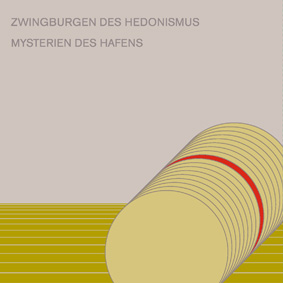- Administrator
- Albums and Singles
 Dressed in black, as ever, this Prurient lathe sits more easily alongside his recent Load release Pleasure Ground than his circuit board slaughter. This track leans a little less on the ripping-out-throats-with-teeth style and more on a knife edge tension tip. This is more like slow insidious mental torture than someone merzbowing your face into a pulp.
Dressed in black, as ever, this Prurient lathe sits more easily alongside his recent Load release Pleasure Ground than his circuit board slaughter. This track leans a little less on the ripping-out-throats-with-teeth style and more on a knife edge tension tip. This is more like slow insidious mental torture than someone merzbowing your face into a pulp.
There are noticeable, albeit brief, rhythms in the avalanche alongside tower levelling greater bass pulses. Several ominous silences don’t make this any less scalding, the spew creeping like brittle ossification. The weight of this lathe comes in speedily rising increments of needle under fingernails pain. Prurient's rage sounds all the more rotted and dark with the focus of the lyrics here.
It's difficult to make out all the words in Prurient's full verse, the vocal fx and the crushed salvo of rolls obliterating some of it. His spoken word soliloquy comes somewhere between Slint's Brian McMahan and something on the darker side of the now fallen Rollins. Although with Prurient we are safe in the knowledge that he won’t be appearing in any shitty commercial movies anytime soon.
samples:
Read More
- Administrator
- Albums and Singles
 The world is shockingly louder after hearing Andrew Chalk's work. This is true of many of his pieces, but seems most applicable to the reissue of East of the Sun. Originally released in 1994 on cassette by OR (Ora's label), the album is as quiet and reserved as they come, teeming with invisible life that always seems just beyond the reach of the human ear. There's plenty going on in these washes of sound, but everything seems consciously subliminal from the second the album begins.
The world is shockingly louder after hearing Andrew Chalk's work. This is true of many of his pieces, but seems most applicable to the reissue of East of the Sun. Originally released in 1994 on cassette by OR (Ora's label), the album is as quiet and reserved as they come, teeming with invisible life that always seems just beyond the reach of the human ear. There's plenty going on in these washes of sound, but everything seems consciously subliminal from the second the album begins.
Faraway Press
Chalk's records always feel like something special, his Faraway Press releases are especially unique and memorable because they're so carefully assembled. East of the Sun comes in a heavy duty gatefold case with elegant and simple artwork. The inside contains only the most pertinent information and a single photograph, presumably of Chalk. As heavy as the packaging may be, the music is perhaps the most delicate Chalk has ever assembled. There are no monumental drones to speak of or massive washes of sound that swim out of the music. Everything is a gentle, microscopic whisper. Even with the volume turned up to its fullest, both "Winter Arc" and "High Water" seem dark and distant, glimmering only faintly, suggesting some distant signs of life.
When the music does uncover itself most blatantly, the resonance and power of the sounds involved is undeniable. The simplicity of both compositions remind me of taking a long walk and being lost in thought or, perhaps more strongly, the sudden realization that there's something going on around you that was not or had not been immediately evident. There are no big surprises on this album: everything comes naturally, but the way Chalk's various sounds work their way in and out of the mix demands repeated listens. I found myself asking where certain sounds came from and how they managed to sneak into the mix without me noticing them earlier.
In the right environment this is a splendid aspect of the album: it commands a quiet place and causes the ears to listen harder, be more attentive. If a quiet place is impossible to find, then this record is difficult to hear and gets subsumed into other noises. I was washing my clothes in the basement while listening to this album upstairs and it slowly fused with the whirl of the washing machine. There's nothing inherently wrong with a quiet album, but unless combining music with household appliances sounds like fun, this album is perhaps best suited for the quietest of times or for a pair of good headphones.
samples:
Read More
in progess
in progress
Samples:
Rob
Orchestre Poly-Rythmo
- Administrator
- Albums and Singles

Released in conjunction with a concert on the 11. November 2006 at the »Lagerhaus« Bremen the CD feat. exclusive tracks by Industrial Music legend Z'EV and New York based percussionist and multi media artist DAVID LINTON who has worked with among others Lee Ranaldo, Glenn Branca, Rhys Chatham, Diamanda Galas, Christian Marclay and Elliot Sharp. Each artist is featured with a solo track plus a remix of the other artist.
Z'EV: www.rhythmajik.de David Linton: www.unitygain.org
Track listing:
1. Z'EV »Soliloquy #1« 11'11
2. Z'EV (LINTON) »Not Nil« 19'58
3. DAVID LINTON »Emerald Portal Excerpt — Part 1« 22'27
4. DAVID LINTON (Z'EV) »7/11elective-RE:mix_Z'EV« 7'00
Total playing time: 60:36 min.
Read More
- Administrator
- Albums and Singles

Part 9 of the ongoing re-release series of all early Tietchens albums from 1980—1991 on CD. This combines two seperate releases from 1987 (»Zwingburgen des Hedonismus«) and 1988 (»Mysterien des Hafens« on »FACE TO FACE, VOL. 1«). »Zwingburgen des Hedonismus« was originally released as a one-sided LP on swedish label Multimood and features a singles 21 min. long track composed on a Fairlight CMI. »Mysterien des Hafens« was part of a split LP (the other side feat. DIE FORM) originally released on french label Odd Size and feat. recordings made by Tietchens using under-water microphones. The Bonus track »Faircomp 1K« on this CD is a different version of the first track and previously unreleased.
First edition of 600 copies in jewel case with full cover artwork and poster booklet also feat. the original album covers.
Track listing:
1. »Zwingburgen des Hedonismus« 21'07
2. »Faircomp 1K« (Bonus track) 16'55
3. »Bubendey Notturno/Ritual auf der Halde« (Mysterien des Hafens) 18'39
Total playing time: 56:41 min.
Up until today I only undertook the effort to compose music with the help of a special composing programme twice. One of these two resulting pieces is »Studie uber B-A-C-H« (originally titled »Faircomp 1C«) which appeared on FORMEN LETZTER HAUSMUSIK in 1984. The matrix which was developed for the music computer Fairlight CMI, could be altered in structure, length and also instrumentation according to the needs of the composer. The first version (»Faircomp 1A«) was recorded in 1982, the last one (»Faircomp 1N«) in 1986. ZWINGBURGEN DES HEDONISMUS (originally titled »Faircomp 1J«) is still the soundwise richest of all these versions despite its overall meagreness. The second version included here (the bonus track »Faircomp 1K«) already borders on the edge of mannerism with its instrumental and dynamical one-dimensionality. Actually the whole Faircomp series was — to use the words of Max Bense — a »precise pleasure«, which basically consisted of transforming kybernetic possibilities into something audible. Nevertheless ZWINGBURGEN DES HEDONISMUS (originally »Faircomp 1J«) saw a release as a one-sided LP in the end because of the braveness of the swedish label Multimood and also because of the fact that the work displayed a relative richness. I also wrote the matrix for a »Faircomp 2« series, but it was never fed into the Fairlight CMI. This computer was abandoned and replaced by the DX 7 and up-to-date samplers and computers in 1987. It seems that time has passed the »Faircomp 2« by. But who knows...?
ASMUS TIETCHENS »MYSTERIEN DES HAFENS« (Odd Size OS04) 1988
Both tracks were already recorded in 1986 and are outtakes from the GEBOREN, UM ZU DIENEN album on EG. They didn't make it onto this album though,because I felt that they differed from the other tracks not only in content, but also musically. I therefore put them aside as an option for a possible second LP on the EG label, but in the end that was not the case. The label »Odd Size« made an enquiry if I'd like to contribute one side to the split LP »Face to Face, Vol.1«, and I immediately offered them MYSTERIEN DES HAFENS, because the two tracks — blended into each other — made much more sense in this isolated format. They refer to two specific places in the harbour of Hamburg. Both places have been transformed beyond recognition during the last 20 years though. Only a few photos that I took and the music are still wittness of what has already become history. Sic transit gloria mundi — and not without some regret. Stylistically MYSTERIEN was close to Industrial Music although it was released kinda late for that. But back then we didn't waste a thought, that the glorious years could already be over, also because the taking over by the enemy couldn't be forseen by anyone then. So empty bunkers and dumps still remained the favourite playgrounds of post-nuclear campfire rituals. But these fires would be dead soon.
Asmus Tietchens, 2006
Read More
- Administrator
- Albums and Singles

Celebrating the 25th anniversary of the very first Z'EV studio album which originally came out on Backlash in 1981, DIE STADT is proud to announce the re-release of »Production and Decay of spacial Relations« for the first time on CD. It features the original seven tracks from the vinyl plus six »recodings« entitled »Reproduction and Decay of spatial Relations« made by Z'EV in May/June 2005.
Back in the day Z'EV used to bring boxes over from Holland when he would come back to New York City which he would sell to Bleeker Bob (a famous Record Shop situated in the East Village of NY) who told him: »this is the best industrial record ever and I sell it to every japanese buyer who comes into the store«.
The CD is housed in a reproduction of the original LP (!) cover and comes with a special handmade insert. First edition of 500 copies.
Track listing:
1. »VUUR UUR 1« 4'31
2. »OP ZOOM 1« 3'44
3. »OP ZOOM 2« 3'59
4. »VUUR UUR 2« 4'48
5. »ZUID/ZUID OOST« 4'12
6. »VERS LICHT« 4'48
7. »OOK UIT« 7'43
8. »Recoding of Track 1+4« 5'19
9. »Recoding of Track 2« 4'32
10. »Recoding of Track 3« 5'56
11. »Recoding of Track 5« 5'03
12. »Recoding of Track 6« 7'21
13. »Recoding of Track 7« 8'02
Total playing time: 79:57 min.
The first edition of 500 copies also includes a bonus CD with never before released archive material all recorded in 1982 entitled »That was the year that was what it was«. It features the following tracks:
1. Z'EV »The sound of the light of metal for Jackson Mac Low« (18'11)
Cassette recording by Lynn Holst of a »wild-style« Z'EV performance in Martinson Hall at the Public Theater NCY 6 Dec 1982 (as part of the language / noise series produced by Ms. Holst. »I was invited to perform and choose 2 others, choosing poet Jacson Mac Low and text/sound artist Peter van Riper)«
2. UNS »Past todays« (18'38)
Cassette Recording by Merle Steir Live in Martinson Hall at the Public Theater NYC 24 may 1982. Vocals: The Sha'ul Z'EV persona. Sound by UNS: 2 VU matic turntables with 3 tone arms - modified for controlled skipping - each turntable held 2 records: »aside + beside« 12" by TO; Will Jackson + S. Weisser (2 copies) + »Wipe Out« 7" by Z'EV (2 copies) (Performance came after a group reading organized by Barbara Ess by a variety of artists of excerpts from the article by Paul Crutzen and J. Birks entitled »Nuclear Winter« that appeared in Ambio)
3. Z'EV »Element/L« (10'28)
From a cassette master. Source: Rough mixes recorded on cassette from the »Wipe Out« sessions recorded at Sorcerer Sound NYC June 1982. Rendering: July 1982 at Studio Od, Eindhoven. Tools: Sony TCD5M cassette deck, Revox 2 track. Overdubbing with splicing tape over erase head, splicing tape and block , single edged razorblades.
NOTE: At this time in history, cassette was THE ubiquitous storage medium, and while perhaps in this digital age some may feel the quality of the recordings seem to leave something to be desired, the performances here documented still deserve to be heard.
Total playing time: 47:16 min.
Read More
- Administrator
- Albums and Singles

The second installment of a short series begun with the »Sanctus« album issued by Robot Records (RR-35) in January of 2006. »Amen«, »Unto the Aeon of Aeons«, is a work of two parts using: grand piano, Hammond organ, tower bell, gong and voices.
The CD is pressed in a first edition of 600 copies in digipack.
Track listing:
1. »Amen 1« 20'04
2. »Amen 2« 20'04
Playing time: 40:08 min.
Read More
- Administrator
- Albums and Singles
STORM
Chris Watson ¬ BJNilsen_
Touch # Tone 27
CD
3 Tracks – 18:09
Chris Watson writes:
“During December 2000 several significant storm fronts developed across the North Sea and Scandinavia.
Benny remarked to me that he had recorded some of these on the Baltic coast and proposed a collaborative cd project based around our mutual interests in the rhythms and music created when the elements combine over land and out to sea.
We spent the next few years gathering recordings on our respective coastlines and islands during the very active weather windows during the autumnal equinox and winter solstice. This was focused around our following one particular cyclonic system, which veers over Snipe Point on Lindisfarne to the Isle of May in the Firth of Forth, and finally descends upon Öland and Gotland where Benny listened in with a favourite pair of Sennheiser omnidirectional microphones.”
Chris Watson
Newcastle upon Tyne August 2006
Track Listing and notes:
1. Chris Watson - No Man's Land 15:51
Late October on the strands of Budle Bay where dense layers of transient alien voices are swamped by a full moon tide creeping across the island’s silver causeway.
Now lapping out of the gathering gloom an immersive sea wash is filling then draining away carrying slow currents from here to another place.
There are no reference points in this darkness.
Glimmer dawn in the gaping mouth of a sea cave below Tarbet Gulley where the siren songs of Cromarty, Forth & Tyne ebb and flow with the swell.
Draw in close but hear now a fresh voice from beyond the horizon.
Recorded during the months of October & November from 2000 to 2005 on the North East coast of England and Scotland. Microphones; Sennheiser 2 x MKH 110's binaural pair, MKH 60/30 M&S rig, DPA 2 x 4060's spaced omnis. Recorders; Nagra lV-S, Nagra Pll and Sound Devices 744T. Edited and Mixed in Boston July 2006
2. BJNilsen & Chris Watson – SIGWX 18:18
Viking, Forties; Cyclonic North East gale 8 backing North later 3 to 4.Thundery rain, moderate to good.
Mixed in Boston and Stockholm June & July 2006
3. BJNilsen – Austrvegr 15:28
A black ruthless sea. Heavy winds making it impossible to stand up straight, icy rain hitting your face like needles.
Recorded on the southeast coast of islands Gotland and Öland, Sweden, using a pair of Sennheiser 110 binaural mics straight to a Tascam DA P1 DAT during December 2003 and July 2004. Locations used included cottages, sheds, barns, fields and the coast. Edited and Mixed in Stockholm 2006
CHRIS WATSON
A sound recordist with a particular and passionate interest in recording the wildlife sounds of animals, habitats and atmospheres from around the world. As a freelance recordist for film, tv & radio Chris Watson specialises in natural history and documentary location sound together with track assembly and sound design in post production. He has released 3 solo CDs for Touch: 'Outside The Circle of Fire' [1998], 'Stepping into The Dark' [1996], 'Weather Report' [2003] and one album, 'Star Switch On' [2002, Tone 18], features recordings based on his work by AER, Biosphere, Fennesz, Hazard, Philip Jeck, Mika Vainio as well as two original recordings by Chris. 'Stepping into The Dark' won an Award of Distinction at the 2000 Prix ARS Electronica Festival in Linz, Austria.
BJNILSEN
BJNilsen lives and works in Stockholm, Sweden, Born in 1975. He has been active with experimental music and sound since the early 1990s with various constellations. Since 1999 he has been releasing records as Hazard on the UK labels Ash International and Touch, making music and sound for documentary film, television and commercials. He is focused on the sound of nature and its effect on humans, field recordings and the perception of time and space as experienced through sound, sometimes electronically treated.
He has released various albums for Touch and Ash International. His last solo release was 'Fade to white' [Touch, 2005] and he collaborated with Chris Watson on 'Wind' [Ash International, 2001] and 'Land' [Touch, 2002].
Read More
- Administrator
- Albums and Singles
shoppe at www.foetus.org! You wont find this in stores or from any other online retailer.
This 72+ minute CD contains previously unreleased material recorded in the last couple of
years. Along with newly recorded material, some of the material was originally written
during the LOVE sessions . Also included are collaborations with Rotoskop and the Melvins
and a remix by Phylr. JG Thirlwell regards DAMP as a "satellite" album to the last FOETUS
release LOVE. The DAMP cover is a deluxe ten panel foldout on heavy card with lyrics,
featuring photos and design by JG Thirlwell. The complicated printing process involves
spot hi gloss lamination which took a long time to perfect in the printing process.
You can hear excerpts from the album at www.foetus.org
01) I Hate You All [03:26] (2003, mixed 2006) Originally commissioned for Japanese
recording artist Atsushi, this furious big band stormer appears here performed by JGT for
the first time. *previously unreleased.
02) Antabuse [01:51] (2006) A brand new instrumental composition. *previously
unreleased.
03) Chimera [04:55] (2004, mixed 2006) A lullaby/hymn originally written for the LOVE
album. *previously unreleased.
04) Into the Light [06:33] (1995, improved 2006) The definitive version of a the track
that previously appeared on Null, this is the definitive version with a different improved
second movement. *previously unreleased.
05) Shrunken Man [05:00] (1999) This is a radical reinterpretation of a song by The The;
it was commissioned by JGT's dear pal Matt Johnson and previously only appeared on the
very limited The The Interpretations EP. Remastered 2006.
06) Mine is No Disgrace (w/Melvins) [08:23] (2000) JGT's collaboration with the Melvins;
it previously appeared on the Melvins The Crybaby album. Remastered 2006.
07) Hemo the Cuckold [07:29] (2004) This unusual epic was originally written around
the time of the LOVE album. *previously unreleased.
08) Not In Your Hands [05:20] (2005) The classic track previously on the (not adam) EP;
this is a re-mastered version.
09) Paging Dr Strong (w/Rotoskop) [03:18] (2003) This track previously appeared on the
Rotoskop album revolution:lost, but this is the raw demo version with a different mix.
*previously unreleased.
10) Blessed Evening (Phylr remix) [04:12] (2006) A remix of the blessed evening track
from LOVE by Jim Coleman, JGT's partner in Baby Zizanie (aka Phylr and Here; ex-Cop
Shoot Cop). *previously unreleased.
11) Sieve [05:00] (2006) This was performed by versions of the Foetus live ensemble for
a couple of tours. Initially written as a live track, this is the first time a studio version has
existed. It is newly recorded for DAMP. *previously unreleased
12) Cold Shoulder [16:08] (2006) A brand new sixteen minute instrumental. *previously
unreleased.
please visit www.foetus.org
Read More
- Administrator
- Albums and Singles

NOVEMBER
(AND ALSO THE TREES / YOUNG GODS)
Announcing the debut of a new collaboration
NOVEMBER is an extraordinary collaboration between film soundtrack composer and 'The Young God's' drummer Bernard Trontin and Simon Huw Jones, singer/lyricist of 'And Also The Trees'.
Their blend of music, that unites deep, electronic sound-waves, low- fi loops, glitches and rhythmic pulses with a vocal that drifts from subtle melody to poetic narrative is unique and will interest fans of Nick Cave and Stuart Staples as well as anyone into dark-ambient music such as Biosphere, Boards of Canada and Coil.
NOVEMBER is a unique experience and a masterpiece of electro-acoustic. This is Shayo 010 coming as a deluxe digipack, with booklet, mastering by Denis Blackham (Biosphere, In Gowan Ring, ...).
You can have a brief taste of the evocative music they've come up with here:
November at Strange Fortune
NOVEMBER is a Shayo release distributed in North America by Strange Fortune. Expected ship date in North America will be December 7th.
Strange Fortune
www.strangefortune.com
The source for strange & exquisite sounds
Strange Fortune / PO Box 440383 / Somerville MA 02144 USA
Read More
- Administrator
- Albums and Singles
artist: Vanishing Voice
title:Nordic Visions
catalog #: IMPREC132
format: cd
upc: 793447513225
release date: February 27, 2007
Nordic Visions was originaly released in a tiny vinyl edition of 525 copies which sold out immediately. Here it is by demand, resurrected as a digital tiki for the original vinyl release.
While Wooden Wand and Satya Sai jammed with the Sky High Band in beautiful California, the Vanishing Voice dug in deep in the frozen northeast. Snowed in with utopian texts and mounting paranoia, Steven The Harvester, Heidi White Diamond Diehl, and Pete Wolfy Nolan joined Nonhorse in an abandoned textile factory, boiling out these ballads of suspended disbelief and hope for the better world.

Read More

